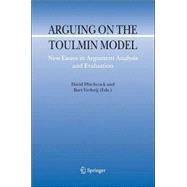
| Introduction | p. 1 |
| Reasoning in theory and practice | p. 25 |
| A citation-based reflection on Toulmin and argument | p. 31 |
| Complex cases and legitimation inference : extending the Toulmin model to deliberative argument in controversy | p. 39 |
| A metamathematical extension of the Toulmin agenda | p. 49 |
| Toulmin's model of argument and the question of relativism | p. 71 |
| Systematizing Toulmin's warrants : an epistemic approach | p. 87 |
| Warranting arguments, the virtue of verb | p. 103 |
| Evaluating inferences : the nature and role of warrants | p. 115 |
| 'Probably' | p. 145 |
| The voice of the other : a dialogico-rhetorical understanding of opponent and of Toulmin's rebuttal | p. 165 |
| Evaluating arguments based on Toulmin's scheme | p. 181 |
| Good reasoning on the Toulmin model | p. 203 |
| The fluidity of warrants : using the Toulmin model to analyse practical discourse | p. 219 |
| Artificial intelligence & law, logic and argument schemes | p. 231 |
| Multiple warrants in practical reasoning | p. 247 |
| The quest for rationalism without dogmas in Leibniz and Toulmin | p. 261 |
| From arguments to decisions : extending the Toulmin view | p. 273 |
| Using Toulmin argumentation to support dispute settlement in discretionary domains | p. 289 |
| Toulmin's model and the solving of ill-structured problems | p. 303 |
| Arguing by question : a Toulminian reading of Cicero's account of the enthymeme | p. 313 |
| The uses of argument in mathematics | p. 327 |
| Translating Toulmin diagrams : theory neutrality in argument representation | p. 341 |
| The Toulmin test : framing argumentation within belief revision theories | p. 359 |
| Eight theses reflecting on Stephen Toulmin | p. 379 |
| Table of Contents provided by Blackwell. All Rights Reserved. |
The New copy of this book will include any supplemental materials advertised. Please check the title of the book to determine if it should include any access cards, study guides, lab manuals, CDs, etc.
The Used, Rental and eBook copies of this book are not guaranteed to include any supplemental materials. Typically, only the book itself is included. This is true even if the title states it includes any access cards, study guides, lab manuals, CDs, etc.